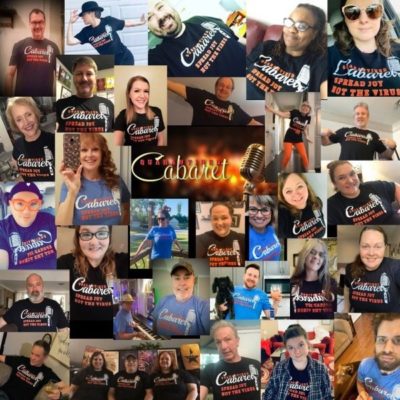
Source: The Quarantined Cabaret
When COVID-19 shut the world down in early 2020, much of it went online. For people with internet access and the ability to pay for home delivery, it’s been a way to keep basic needs met and help some small businesses survive—even if it’s been rocky.
What I’ve found hopeful is the creative ways individuals, families and communities are adapting to meet emotional needs as well.
Windows and Balconies
For seniors suddenly isolated in nursing homes and families unable to visit, windows became a bright spot. One man whose job involved driving a bucket truck drove it to his mother’s third floor window at her assisted living facility. He phoned her and when she opened the curtains, there he was, smiling and waving. Windows became places where engagements were announced and tic-tac-toe and hangman were played with grandkids. Teddy bears on window sills were the focus of community scavenger hunts to entertain and connect at a distance. Some stepped outside their windows, turning their balconies into stages, letting neighborhoods sing and dance.
Sharing & Enjoying Talent
The Quarantined Cabaret popped up on Facebook to give singers, dancers, actors, comedians and other creative performers a way to share their talents and people stuck at home a way to enjoy them. Then it morphed to sharing high school productions that were cancelled due to the shelter-in-place. What started as a small group of friends quickly turned into tens of thousands of people from all 50 states and many countries. People who don’t usually get to showcase their talents and people who live in remote areas where it’s difficult to find live entertainment benefit too.
Re-Purposing & Making Do
One couple let their elementary school aged kids organize date nights for them. Travel professionals, missing life on the road and using their gear, re-purposed it to help neighbors haul their groceries, set up camp for their kids in the living room or create a swinging hammock bed for the feel of adventure at home. Some people dressed in head-to-toe costumes or outfitted themselves in clear-plastic trash bags to hug loved ones.
Adapting Business and Ritual
Some small distilleries switched from brews to making hand sanitizer. Others re-tooled to sew and distribute masks. Restaurants, closed to indoor dining and shut down completely in some places, switched to home delivery and providing free-of-charge meals to community members in need. With traditional funeral and memorial rites curtailed, funeral directors and faith leaders modified rites, such as drive-in funeral ceremonies and livestreaming services. Newspapers expanded online obituaries. Some families held funerals at home.
Attention Affects Behavior
What captures our attention shapes our sense of the world. When what we hear about most in the media are the problems, it can be overwhelming. Especially at a time when we’re so much more isolated than usual. Let’s notice our adapting, resilience and creativity and give it its due. By all public health accounts, the pandemic’s going to be with us quite awhile longer. In our global world, it won’t be the last either. One important change that could come from this COVID experience would be a more balanced portrayal of our lives and world.
